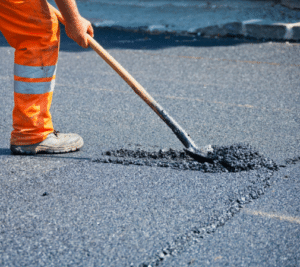The best contractors know that the life of an asphalt driveway is directly related to asphalt grading. You can quickly tell the driveways that were prepped correctly versus those swiftly done without much added attention. The pavement done incorrectly will lay uneven, potholes will form, and water will pool, especially on a high-traffic driveway.
The problems often lie with the asphalt’s grading and the care taken to ensure it is done correctly. During a rush job, cracks and breaks form very quickly, and the only recourse is to start from scratch. It is crucial for the driveway’s longevity to be graded in a way that will work best for the surface, be it rough grading or finish grading, and only hire a contractor that knows what is needed.
What is Asphalt Grading?
The process of leveling an asphalt driveway before paving is called asphalt grading. The land area where the pavement will eventually be poured is filled, cut, leveled, and pitched. This ensures the soil can handle the pavement’s weight and that water runs off properly. Pooled water can lead to asphalt degradation.
This is especially important on land that has hills and slopes. When grading, proper leveling can be the difference between water runoff flowing toward a storm drain and flowing to your home’s foundation, potentially flooding lower areas such as your basement.
Proper asphalt grading also improves the driveways traction, which is especially important during the winter when ice is present.
When is Asphalt Grading done?
There are two times when asphalt grading can be done. The first happens when repaving a section of road, and the second is when a new driveway is implemented. The repave is done with large machines that remove the older pavement, starting the driveway from scratch.
When paving a new driveway, the process is executed in four steps:
Step 1. Prep is important. Since rough grading digs into the ground before the dirt is compacted, inspecting the area for water, gas, electrical, and telephone lines buried in the work area is essential. This is also the time to survey for runoff drainage. Having extra dirt to fill in the area to be leveled is wise.
Step 2. Check the slope. Drainage is best determined after you have found the high and low ends of the driveway. The drop should be a 2-inch minimum in all directions leading from the home.
Step 3. Even it out. After ascertaining the slope, it is time to level and, if necessary, fill the driveway to make it uniform. This is called finding the grade line. It is done by measuring the horizontal and vertical distances.
Step 4. Create the Subbase. Filling in the even ground with a layer of rocks and soil will create a frost barrier between the asphalt and the ground below. It also helps in leveling the driveway before the pavement is added.
The quality of which the sub-base is packed is linked to the pavement’s longevity, as is the base thickness. Base thickness and stability are crucial. If the base is too thin, the weight of the asphalt will shift the ground and cause large cracks, whereas a base too thick will allow the sub-base to freeze for too long.
Every step of the asphalt grading process is designed to one end: the pavement’s longest life.
What Are the Different Types of Grading?
The two types of asphalt grading are rough grading and finish grading. Rough grading sets the foundation and shape for the pavement, while finish grading essentially works on the top two inches of soil to give the final contours before paving. Both types are necessary to provide the proper slope and shape for the land that is to be paved. Simply put, rough grading is like painting with a roller, while finish grading is similar to using a fine brush.
Rough Grading
The overall slope and shape are formed during rough grading. The land is flattened by professional contractors who know how the drainage will work in the area and devise the correct slope to produce an efficient runoff flow. This often includes heavy equipment and special tools; new soil is brought in to fill gaps. Rough grading is excellent if you have struggled with drainage in the past.
Finish Grading
Finish grading is only possible if the area has already been rough graded. With finish grading, the final focus is on the contour and elevation of the surface. Rocks and hard clumps are removed, the soil is made uniform, and the pavement is now ready to pour. This is also done when planting sod is the end goal.
Rough Grading vs Finish Grading
The major alterations required to make the soil viable for pavement will all be done during the rough grading step. Any large machines that drag away and level the ground will be seen here. When it is time to finish grading, the tools are more specialized, and the smooth, packed soil alterations are done carefully. If done incorrectly, the whole process must be redone.
The Two Shapes of Asphalt Grading
Whether you see it or not, every driveway has a higher spot in the center called the crown. The crown is designed to aid runoff so standing water doesn’t degrade the pavement. The height of the crown depends on three factors:
- Length of the driveway
- Average expected runoff
- Traffic flow
The crown is the weakest point on the driveway because vehicle weight distribution pushes down on the asphalt and can cause shifts, cracks, and fissures over time. Traffic straddling the crown exacerbates the issue.
The length of the driveway directly correlates to how much traffic it will see. Longer driveways with greater vehicle movement have a shorter crown.
Asphalt Grading Contractor
When getting your asphalt graded for paving, the best course is always to have a professional contractor with a sterling reputation in the industry do the work. They will never take shortcuts and guarantee their best work. Check reviews and talk to others who have used them. Ask questions and get estimates. For your pavement, peace of mind comes from being informed and hiring the right paving company.
If you’re in need of a grading contractor, contact us at Saguaro Asphalt. We specialize in asphalt grading and other services, including asphalt paving, repair, and driveway installation. We can answer any questions and give you an estimate for your upcoming project.



